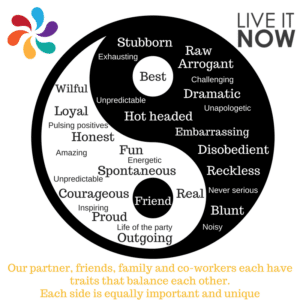

How to Have Amazing Relationships 1: Relationships with Others
Table of Contents
Good relationships are an important part of life. Get your relationships right and you set a basis for a life of happiness and freedom. Relationships are important because they are everywhere, at home, at work, fitness, health, in your extended family and your social life.
(See Part 2 for relationship with self!)
When you are under pressure from a relationship or things are tense or destructive it affects everything around you, like a ripple in the water spreading out into other areas of your life. For example a poor relationship at home can affect other areas of life, causing stress and maybe even a lack of motivation in health, at work, or with your finances.
The best way to learn about great relationships is to model our behaviour and mindset off people who are already achieving excellence in their relationships.
That’s the heart of Neuro Linguistic Programing (NLP). To study excellent behaviour and map the mental pathways that create great results. It always comes down to great communication, a positive mindset and creativity.
By studying people who are able to grow and develop great relationships we can learn and adopt great relationship patterns for fast proven results in our own lives.
Here are some keys to use to help engage, develop and keep great relationships.
Listen Actively
Finding someone who listens really well is a hard task. Even people who don’t talk much can be distracted or inattentive listeners. That’s why being a great listener is something people will notice and appreciate from the start.
To practice active listening:
-
Take a genuine interest in the other person
Ask questions, explore ideas, and let them go into as much detail as they like. Some people like you to repeat back what they say (you can change the words a little) so they know you get their meaning. Try it and see if they respond well.
-
Walk in their shoes
The best way to see the world from someone else’s view is to imagine yourself in their shoes, not literally of course, (unless it’s part of your natural discussion).
We all see the world differently, so to really create a connection you will need to bend your own views to consider theirs. Without this step you may find that you are butting heads. Putting yourself in their shoes doesn’t mean you agree with what they say or that you adopt their point of view, it’s just that you see where they are coming from so that you can get a better idea and understanding of what they are experiencing.
-
Keep your mind quiet
The real reason so many people find it a challenge to listen actively is because they are already busy listening to themselves.
Our self-talk might not be loud, but it can be constant.
Instead of fully listening to another person our brain is busy pre-planning or rehearsing a reply, getting ready to launch into our own similar (super interesting) story, thinking about what we are doing next or caught up in something we just came from. It all boils down to one thing: not being fully present. When this happens you limit your ability to hear as well as your ability to respond. You need to clear your own mind from thoughts and chatter and let your natural energy take over the conversation. Trust that your responses will be well received and let it go if they are not. You’ll find that you will open up a whole range of responses that you didn’t even know existed.
-
Show empathy not sympathy
“Oh, you poor thing” might seem like the right response sometimes, however you are not empowering someone to lift or move from their negative situation. In a great relationship your response will create a feeling of courage and power to face a challenge.
Getting bogged down in sympathy draws them and yourself into a negative frame of mind. While sometimes people actively look for sympathy in a conversation, even in that situation though it is not a good idea to reward this behaviour. Help them achieve freedom from this habit by responding in a way that shows them you care and understand their difficulties and trust them to move past it.
A great friend, co-worker, parent or partner can help empower someone to move forward. Otherwise everyone could get sucked into a negative loop of feeling sorry for themselves.
-
Find positives
Everyone has some good attributes that are much more powerful than their flaws. Take the time to find out and focus on the positive points other people have so that you can help calm their frustrations and develop a genuine respect for people you find hard to get along with.
Start with a compliment. They will need to be genuine and part of the conversation to sound sincere. When done correctly you can get amazing results. For example a boss who says to an employee, “That outfit looks really great on you”, will encourage them to wear more of the same in the future, rather than if they humiliate the employee by drawing attention to a negative, like, “Please do not wear that to work again it looks horrible.”
By drawing attention to positives we let people know the behaviour or actions we like and admire about them and what to do more of. If we criticise negative behaviour but provide no direction for what is acceptable and wanted we are severing communication, outcasting people, and demoralising and degrading someone with no positive gain.
Look for positives in people and encourage them with positive responses to great work.
-
Maintain contact
The frequency of contact will depend on the kind of relationship you have. For a romantic relationship you might want to stay in touch every few hours with a one line email or text message to ask about their day or let them know you are thinking of them.
Long distance relationships with family and friends will benefit from regular letters, calls, cards and emails between visits.
Catching up with ex-colleagues is a great way to maintain close friendships that might potentially be lost with an office move.
Think of ways you can overlap your work friends with your social life by inviting them to social occasions, forming a sports team or going to the gym together. This will open up new conversations and develop better friendships through variety and more contact.
Understand their View of the World
Seeing the world your friend, child, parent, partner, boss or colleague lives in is key to a great relationship.
Without this flexibility you can potentially clash or even step on each other’s toes across a wide range of important viewpoints, like personal beliefs, emotional responses, values and life experiences.
When it comes to points of view, no one is ever right or wrong, it’s just different perspectives.
-
Respect their view of the world
It’s okay to recognise their view for what it is. It doesn’t mean you are wrong or your world is wrong. Right or wrong really doesn’t come into it. Our worldview is shaped by our personal life experiences and history. Our ability to experience new things means we are also able to see the world differently as we learn and grow. Showing someone patience and flexibility when you look at their model of the world means they are more open to growth and change and that you are open to providing support at the level they are on, rather than the level you are on, which may come across as being preachy or bullying.
As a bonus, when you take the time to see another person’s world you gain an essential understanding into your own view of the world and see new and incredible pathways you yourself can take.
-
Accept mistakes
Just like your perceptions of ‘right’ and ‘wrong’ are influenced by your own view of the world, what you see as ‘strength’ and ‘weakness’ is also based purely on your own point of view.
Recognise and appreciate other people’s faults knowing that the perception of ‘fault’ is only in your mind. Taking that imperfection away from a person may actually have terrible consequences for how amazing or talented they are. I like to picture a Yinyang here. We each have a perfect balance of light and darkness that makes us a complete energy.
“Perfect” people do not exist anywhere. Those who are incredibly talented in one area usually show massive faults in another. We each take and choose what is important to us in our lives.
See the person as a whole and appreciate what they bring to the table.
-
Know when to stand your ground and when to let things be
There are certain times when it’s important to stand your ground. You need to pick your battles carefully and set clear boundaries around what is important to you.
If someone asks you to do something that negatively impinges on your lifestyle or goes against your values it’s important that you are able to make a polite and firm stand and explain why that doesn’t work for you. If you live your whole life trying to please other people you become trapped in a prison of their good intentions, and as a result you stop taking control of your own life and veer off of your own personal path and away from your passions. So while pleasing people is an important part to good relationships, it does need to occur on your own terms. Other people’s happiness is not your responsibility.
In most cases there will be inaccuracies and clashes in conversations and it is best to let them go as they really aren’t important. You can let the other person have their moment of happiness, being blissfully ignorant, without being negatively affected yourself.
It’s quite a fun and peaceful experience actually to be able to pick and choose what matters instead of piling up and dragging out every little instance.
It’s all about having a good perspective on what really matters to you so that you can easily let things go or stand your ground when you need to.
-
How do you want to be remembered?
In the heat of an argument or frustration with someone you might not be thinking too much about your tombstone (although you might be contemplating theirs). Do think about the lasting impressions you are making. The conversations you have and the way that you behave and treat people actually paints and describes your character. When you look at your personal portrait is it something you like and want to be known for?
Spend time doing and talking about the things you want to be remembered for. Life is short, use your time well.
The other way this can work is by pretending you are under video surveillance. Are your actions and words in relationships something you would want to share with the world? Would you act differently if you knew someone else was watching?
-
It’s not your job to change or fix anyone
This is a massive trap. Trying to help or fix or change someone is about you, and not about them. Unless they have specifically asked for your help or advice do not give it. They are fully capable of making their own choices and living their own life. Even if you see a change as imperative, unless they also feel that change is important, nothing will happen (except that you will get frustrated and worn out).
Behind every mistake is a lesson. Allow people to make mistakes to get to their lessons in their own time and their own way. Chances are, if you are operating from your view of the world they will have no idea what you are talking about anyway, all they will hear is negativity and nagging.
If someone presents you with a problem they are facing go back to active listening and empower them to find their own way through using your understanding and support for who they are as a person.
-
Love that you are unique
We like people who are similar to us and we are attracted to people who are like us. We can never be truly identical to others though, even identical twins are never truly identical. We need to expect and embrace differences. After all, they will be the spice and variety in the relationship when things start to get too familiar. Variety is incredibly important for maintaining happiness and satisfaction, so when you notice a difference get excited and take on the opportunity to learn something new or do something differently.
-
Open communication
Think your body language or silence is speaking for you? It’s not. Everyone expresses themselves differently. Not only can someone misinterpret your body language, they also might have no idea how to respond to it. If you want to let people know something, you have to actually say it out loud.
No one, not even those closest to you, can read your mind and know your wants and desires, you have to open your mouth and tell them, which can be a challenge sometimes as not everyone feels confortable voicing their needs. However, the consequences if you do not actively communicate are massive, ranging from emotional stress and depression to physical illness and dependence on addictive substances.
Even if it means you might be rejected or risk displeasing someone it’s important that you take responsibility and verbalise your wants and needs.
Remember, just like they can’t read your mind, you can’t read theirs either, and maybe the response you are anticipating is all in your head. Tell them how you feel, but do it in a way that is gentle and inclusive. Let them have their own reaction, it may actually be a pleasant surprise.
-
Create mentors
As you create amazing relationships you will also naturally become a leader in some respects. You will rub off on people and inspire them to take action in different parts of their lives. There is nothing you need to do here but embrace and enjoy it. On the flip side, while you will lead, you will also need to find and use these opportunities to follow.
In some ways every person you meet will be your superior. They will outstrip you in life experience, knowledge, training, enthusiasm or creativity in one or more subjects. This is great. Learn from them. Everyone has something to share and they feel great when they can pass on their passion. This is where the true value of relationships is revealed, that we make incredible space to grow and learn from each other.
At Live it Now we help mend broken relationships, enhance good ones, and have even kicked off a few new ones! We would love to help you improve every relationship in your life, grab a free ticket and watch your relationships take off.
Kindest regards,
Matt Catling







